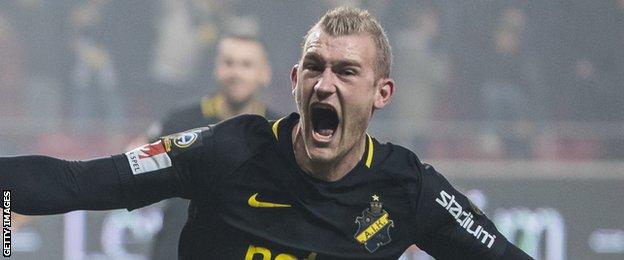How does Scotland's new broadcasting deal compare to other nations in Europe?
- Published
Scotland's Premiership clubs will receive £160m over the next five years for their TV rights, but is it a good deal?
On the same day the contracts for 2020-25 were announced, it was revealed that the English Football League were upset about 'only' getting £595m over the same period for its three divisions.
The SPFL will make around £32m annually from their agreements with Sky, Premier Sports and the BBC - around £11m more than the current ones with Sky, BT and the BBC.
But how does Scotland compare to other nations - excluding the big five of England, France, Germany, Italy and Spain - around Europe?
Turkey

Istanbul Basaksehir are currently top of the Super Lig
Turkey's top two leagues receive a combined £465.2m per season under the terms of their current seven-year deal, which runs until the end of season 2022-23.
According to SportsPro,, external Digiturk's investment makes the Turkish league the sixth-highest earning in the world from broadcasting fees.
And a Deloitte report, external says total revenue (including matchday, broadcasting, sponsorship and other commercial revenue) was 734m euros in 2016-17 - the largest total revenue outside the 'big five' leagues.
Turkey does, however, have a bigger population than all of those countries, except Germany.
Portugal
The Primeira Liga made around £165m total revenue from broadcasting in season 2016-17, according to the Deloitte report.
Yet despite having a significantly bigger TV deal than Scotland, the country generates less in matchday revenues.
Like Scotland with England, Portugal borders one of Europe's major footballing superpowers in Spain.
Sweden

Robin Jansson's AIK have won this season's Allsvenskan
The Daily Record reported, external earlier this month that a new £48m deal to show games from Sweden's Allsvenskan and Superettan from 2020 had been agreed - double the amount of the previous deal.
As a smaller European country, Sweden is often compared to Scotland but it still has almost double the size of population.
But unlike Scotland, Sweden operates a summer season, which commences in April and ends in November. Furthermore most games are broadcast live, reducing the value per game.
Switzerland
The Swiss enjoy similar average match attendances to Scotland.
And, according to Sports Business Daily,, external the multi-division Swiss Football League receives £30.6m annual income from a range of TV deals.
However, Switzerland face a more acute problem than either Scotland or Portugal in that the country borders three major football nations - France, Germany and Italy.
'New deal mostly delivers for Scottish clubs' - analysis
BBC Scotland's sports news correspondent Chris McLaughlin
There was hope that the value of the new TV deal would reflect the new feel-good factor that's attached itself to Scottish football in recent years - the reality was always going to be very different.
Where once these offers were delivered on a hunch and a hope by people who knew the game, these days, young hotshot analysts with no knowledge of the game will crunch the numbers. If the computer says no, then forget it.
Just ask those at BT Sport, who pushed hard to carry on what they'd started in Scottish football only for their corporate machine to say, 'no'. In fact I'm told their offer for an exclusive deal fell "many tens of millions" short of what Sky bid.
One club boss told me they were underwhelmed by what's been signed but others see it differently. The desire was to get more cash, fewer games and a greater say on kick-off times. The new deal mostly delivers on that.
The comparisons to deals signed by other leagues around Europe is also not as cut and dry as it seems. In Sweden, where almost all games are broadcast, they get much more in the pot but an average of around £100,000 per game. The Scottish deal delivers around £540,000 for each match covered.
Yes, chief executives and chairman want money in the bank but they also want bums on seats on a Saturday afternoon. The deal is far from perfect but in an uncertain market it's far from the worst.